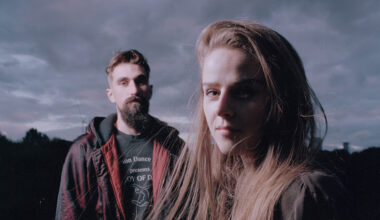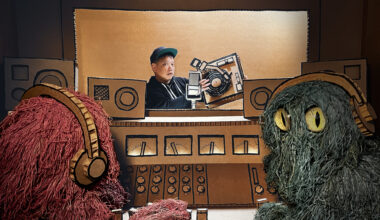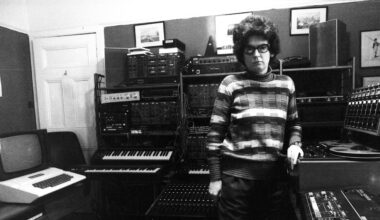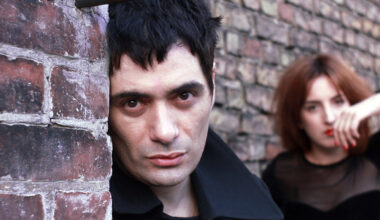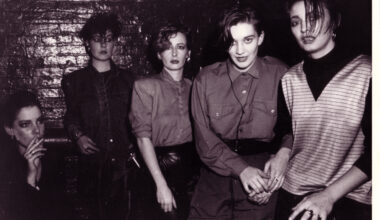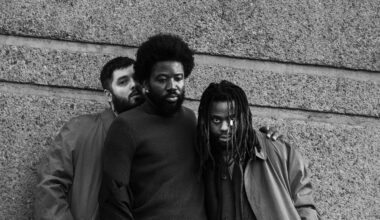In July 2017, Hendrik Otremba met Can’s Holger Czukay in the old Weilerswist cinema where he’d lived and worked since the 1970s. The pair sat down to discuss his retrospective ‘Cinema’ boxset, curated by Otremba and set for release this month to mark his 80th birthday. Shortly after their chat, Czukay’s wife passed away, just a few weeks later, on 5 September, Holger died too. This was his final interview
Mr Czukay, say something…
“To-toot, to-toot, ta-toot.”
Good, the recording seems to be working. We’re sitting above an old cinema in Weilerswist. What is this place?
“This was the projection room. In front of us, in the big theatre area where my bed is, was the sound room.”
You produced your solo works in this cinema; the majority of Can’s albums were recorded here. This place went down in history as Inner Space Studio where many famous international artists recorded. For four decades it has also been your home – a veritable who’s who of people have come through here…
“Yes, you could say that. Still, it has always been a cinema to me. I knew as a child that the movies would play a role in my life. And that they did. The fact that in film the music and audio are recorded separately had great significance for me. That relationship – having two levels that function differently, but belong together – had a formative influence on me. It is a realm of experimentation.
“For instance, we put a table tennis table in the courtyard and set up a microphone underneath it. That resulted in a particular sound. I also played table tennis on it with Jaki Liebezeit’s girlfriend, but I didn’t record that. But the thing with the table tennis table was one of those tricks I never told anyone about. That’s ultimately what made me famous. There was always a particular sound and no one knew how it had been created.”
So you manufactured illusions like the ones they used on the big screen.
“I met Ennio Morricone sometime around 1989. He had well and truly hunted me down to worm my tricks out of me. He wanted to know how I work. We were sitting next to each other at an art symposium during a film festival, but all I said was, ‘I’m not a fan sitting at a table with nothing to eat on it’. Morricone couldn’t believe it. He looked at me with ‘Is this guy crazy?’ written on his face [laughs].”
What did you and Morricone talk about?
“I told him about my strategy of recording people without letting them know I’m doing it in order to capture something that comes out of someone entirely on its own. I did that with kids for the track ‘Hit Hit Flop Flop’, and there you can hear it when one of them whispers to the other, ‘No, don’t say it yet!’. That then becomes my material and is what makes things playful, spontaneous, and maybe even a bit naïve. That is infinitely important to me. I don’t ‘engineer’ things. I’m someone who does what he does very spontaneously and from the heart. But I don’t disregard all reason. That dialogue is principle of my entire work. The crucial things there are the accidents, happenstance. I need accidents; I integrate them into my work.”
So unpredictable events become the basis of a process?
“That’s right. For example, I recorded steps that gave the meter, but I never told anyone. First the steps, then, in a different situation, a time defined by them – without anyone knowing where it came from. Then I see what happens.”
That gives the music an organic, human quality.
“Yes. I remember talking about it with some Catholic clergymen in Brazil, who were utterly perplexed. I told them nothing works without trust in art.”
So what is your concept of art?
“Well, it differs from the one that prevails nowadays. Today, art is far too intellectual for my taste. Sure, reason plays a role, but trusting in art is much more important. There are things for which you can’t plan. That’s why radio plays such a big role for me, because on the radio I find material that surprises me. But it is still a person who is behind that material. I pay very close attention to that person: how can I use him or her? That way I find something innocent, an arbitrariness in music, and that gives rise to a very unique and expanding drama.”
That also explains why your music always seems a little like documentary film; you traverse human history, compiling events.
“Yes, although I was never concerned with political history. Devising a political link was always too out of touch for me. However, if something like that arises, then I’m pretty happy about it. I only create conditions, provide an experimental framework and then I see what happens. That’s how I’ve always conceived of it. Jaki Liebezeit and I had recordings like that back at the very start. I wanted to capture his laugh, which wasn’t all that easy with him. Then I set up a camera and told him to sit on a chair in front of it, which, of course, created this sense of expectation for him. Then I went over to him, put my arm around him and shook him. He started laughing his head off.”

Jaki Liebezeit was the biggest constant in your musical life; you worked more with him than with anyone else. How was your relationship?
“He hated me [laughs loudly]! He said, ‘Don’t play in the space I’m playing in!’. If I was playing the bass part he said, ‘Don’t interfere with my kick drum!’ [laughs]. There was always a tension in our relationship. That was how our recordings with Can were too. I rarely find anything like that today, an instance where the inherent power of the music really takes priority. Far too often it’s all about the specific elements that one has mastered and then working with them.
“My point of departure has always been much more about a holistic, a musical movement. I’ve construed of myself a bit as a medium through which the music flows. Maybe that’s why those priests in Brazil liked me so much. You really can’t do anything without a religious feeling. Otherwise they’re just sounds with no soul. I often miss that in today’s music, even if I find the music interesting. But then it’s more about techniques, about methods and the spirit of the music remains hidden.”
So you’ve always looked for a spirit in music?
“Yes! I remember my sister playing me ‘Träumerei’ by Robert Schumann when I was a little kid. I found something similar to that in that music and I never again forgot it. I was speechless. But the question is difficult to answer and it’s not really possible to describe. Could that just be music?”
What role do samples play in that indefinable sphere?
“A big one! Although I always want to find out what part is music and what part is what I would call ‘clanging drivel’ [laughs]. What has always been important is the question: how do I start? On my track ‘Cool In The Pool’, for example, I needed a starting point and from there the music could grow into something organic. Not being alone is equally important to me. I need some kind of a partner. It could be an anonymous person on the radio or someone from the internet, but I have to find a partner.”
Over the course of your 60-year career you’ve partnered with anonymous radio waves, but also with the complete opposite – with real-life musical celebrities: your fellow musicians in Can, as well as people such as Brian Eno, Jah Wobble, David Sylvian, Phew and Annie Lennox and the Eurythmics. Which of those encounters were the most formative?
“There’s really not much difference [laughs]. I lived with Eno in England for a while. And, in the end, I think Annie Lennox thought I was a bit weird: I had bought myself an officer’s uniform while in Britain during the Falklands War. I put it on and went to the airport, of all places. A customs officer addressed me: ‘I beg your pardon, sir. What ship are you serving on?’. I replied, ‘On the General Belgrano’. That was a huge Argentinian cruiser that the Brits had just recently sunk, along with the entire 500-person crew. The war experience definitely influenced my work; the uncontrollable aspect of it, the fact that you’re left to rely on fortune. I’ve been aware of that since my early childhood in Danzig.”
Mr Czukay, it seems that like you to play tricks on people…
“Yes! When I was working for West German Radio [WDR], I secretly prepared bogus answering machine messages: ‘WDR Cologne, Department of Food Coveting and Intrigue. Please hold the line’. Then a bit later: ‘WDR, Antwerp office’. Back then, making phone calls was still really expensive and that startled people. I recorded that too. I once spoke with Dieter Gorny about a television show. I told him, ‘I’ll get you the best ratings. Don’t run anything I think is good, then you’ll have success’.
“I was always more interested in things that weren’t commercially successful – that includes my own stuff. Even way back at the very start, in 1960, I took part in a WDR jazz competition with the Holger Schüring Quintet – I was still using my given name. Then Dietrich Schulz-Köhn, ‘Dr Jazz’, approached me and said, ‘Holger, the jury just doesn’t have any use for you’. I just couldn’t cope with the music and he wanted to console me. He then invited me to come on his broadcast, in 1960, to Studio 7 at WDR. That was a huge deal for me. That was around the same time I met Karlheinz Stockhausen.
“He was really a very serious composer who had mastered a kind of musical notation that normally wouldn’t pass for music. That systemisation and musical understanding interested me very much. I learned that from him. But, after a time, Stockhausen said to me, ‘You’ve got no business here! The questions I’m asking don’t pertain to you’. He chucked me right out [laughs loudly]. ‘Holger, you have a task to attend to’. I was pretty rebellious back then too.”
Did Stockhausen have a sense of humor?
“People say ‘No!’, but I say ‘Yes!’. I thought that was very obvious. Well, then we founded Can, in 1968. I wanted to play guitar, but we had Michael Karoli, he was better at it so I played bass. In 1977, Rosko Gee joined, who I really liked. He could play bass better than I could. Then I thought of something new – a veritable magic kit with a telephone inside and all kinds of gear – at some point Can lost interest in it. A moment came when Reebop Kwaku Baah, the new singer, pulled the plug on me during a live performance. I then said to myself, ‘I’ll take this three times, then I’m done!’, after the third time I left, in 1978. “I then went to Thailand for a long time. I lived in a hotel as the only guest. I suppose I needed some solitude to sort myself out. There were wild animals there and the landlady recommended that if I ran into a poisonous snake on the stairs I should say, ‘Dear cobra, your path and my path are different. I yield to you’. I then travelled on to China and was in Nanjing and Hong Kong. That’s why the Chinese national anthem made it into my track ‘Der Osten Ist Rot’.
Did that get you into trouble?
“No. The Chinese are anything but naïve. If they differentiate and recognise it as a ‘quoted’ piece, they don’t make a political matter out of it. And I’m not comparing anything in that song, it’s all one organic whole to me.”
You were with Conny Plank in Thailand as well. After Jaki he’d have to be the second biggest constant in your musical life?
“He liked to record in the cinema in Weilerswist; as an electrician, he had the technical know-how. When we recorded a band I increasingly became the animator, the auxiliary engine. That’s how we recorded Jürgen ‘de Plaat’ Zeltinger back then: I went in and played the head honcho, and that’s how we were able to rein in Zeltinger. I really learned something at Conny Plank’s mixing desk. He came in at six o’clock in the morning and asked, ‘So, Holger, what do you say?’. That’s how Les Vampyrettes, our joint project, came to be. That was 1980, shortly after Can.
“At that time a journalist introduced me to Jah Wobble. He had brought six beer bottles with him, but drank just one of them, and in no time we were in London on the way to a studio in Soho, located under a restaurant. At some point curious restaurant guests came down to see what we were doing. We asked, ‘How much are they?’ and that’s how we got the title to the song on ‘Full Circle’.
“I think humor was our common bond, although he thought some of my strategies were absurd. The next time I recorded with Jah Wobble, The Edge from U2 joined us. I thought my guitar playing was pretty mediocre back then, I had no self-confidence, but The Edge said, “Finally, someone who really plays guitar!”. That made me happy. My understanding of the instrument was purely intuitive, he liked that. Previously, with Can, I sometimes used that intuition very consciously to get a reaction from Irmin Schmidt, my musical adversary, and he did the same with me. That was taxing, but extremely satisfying.”
Mr Czukay, is there any advice you would like to give to today’s young musicians?
“Yes. There’s a method to this madness!”
The ‘Cinema’ boxset, featuring music from Czukay’s solo career, unreleased tracks and collaborations, is released by Grönland

